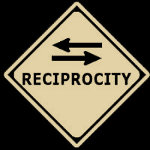Reciprocal Engine
 I have posted before about the ethics of reciprocity – the “Golden Rule” – as have others that I know online, which is not surprising since this Golden Rule seems fundamental to almost all ethical thought, philosophies, and religions.
I have posted before about the ethics of reciprocity – the “Golden Rule” – as have others that I know online, which is not surprising since this Golden Rule seems fundamental to almost all ethical thought, philosophies, and religions.
The question arises though of whether we’ve all failed to fully grasp and internalize both sides of this ethical equation.
Have we focused too much upon the primary action and not enough upon the reciprocal reaction? Have we also failed to recognize that it functions much as an engine, a natural law that we’ve placed too many “higher order” considerations upon?
Any of the variations of, “Do unto others as you would have others do unto you” may serve well as admonishment or exhortation to right behavior by people, but we seem to fail to connect it with, “As you sow, so shall you reap,” which common sense tell us must be the reciprocating side of this ethical equation.
The greatest problem this schism causes is the cognitive dissonance it causes is in those cases where the primary action was a negative or harmful one. This causes both internal conflict and hampers effective mitigation of the negative or harmful effects of the primary actor’s actions.
If the theory of Reciprocal Ethics is true than it must be true in all its parts or be claimed false. Therefor, natural law would require that negative actions lead to similarly negative responses as a normal course of events and to break this cycle requires conscious decision to engage in an unnatural course of response which might very well, due to its unnaturalness, be misunderstood as weakness, vulnerability or surrender of the point in contention by the original actor.
Some few in the course of history have understood this, though with mixed results.
First they ignore you, then they ridicule you, then they fight you, then you win.
— Mahatma Gandhi (Disputed)
Gandhi, through his cult of personality and abetted by the nature and proclivities of the two cultures involved and the greater scope of world events, succeeded in breaking the natural laws of reciprocity and doing so in a manner that achieved his victory, India’s Independence from Britain.
Somewhere somebody must have some sense. Men must see that force begets force, hate begets hate, toughness begets toughness. And it is all a descending spiral, ultimately ending in destruction for all and everybody. Somebody must have sense enough and morality enough to cut off the chain of hate and the chain of evil in the universe. And you do that by love.
— Dr. Martin Luther King, Jr.
MLK seemed to understand the basic equation of reciprocity but did not seem to understand that sense was not what was called for, since sense would lead people to follow the natural order of action and reciprocation. As can be seen by the largely unalleviated and unabated levels of racial angst and hatred among the Black population in America, despite the legal and pragmatic success of the Civil Rights Movement, Dr. King was largely unsuccessful in his prescription.
One has to accept the basic nature of the reciprocal engine that is the foundation of Reciprocal Ethics and fully understand the difficulties involved in convincing people to behave otherwise.
Tags: Ethics & Morality | Evil | Good | Philosophy | Reciprocity

